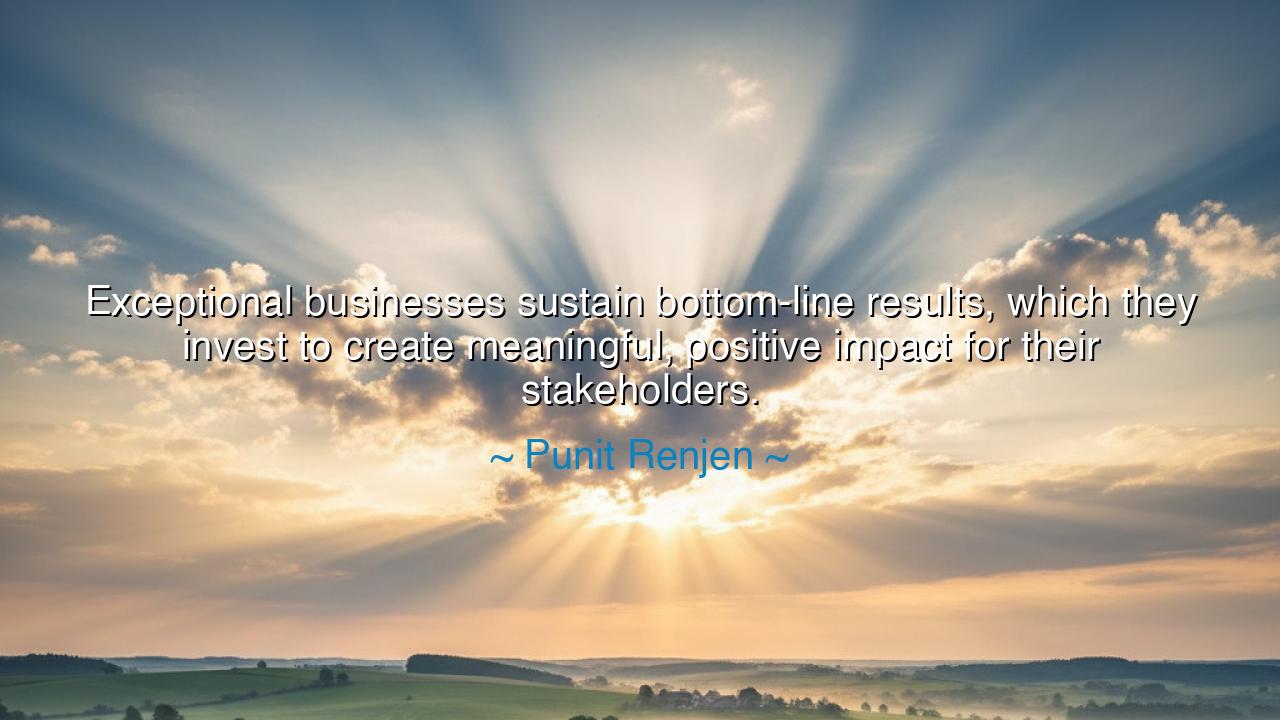
Exceptional businesses sustain bottom-line results, which they
Exceptional businesses sustain bottom-line results, which they invest to create meaningful, positive impact for their stakeholders.






The words of Punit Renjen—“Exceptional businesses sustain bottom-line results, which they invest to create meaningful, positive impact for their stakeholders.”—sound like the wisdom of an elder who understands that wealth, while necessary, is never the final goal. They remind us that the greatness of an enterprise lies not only in profit, but in purpose. To be exceptional is not merely to accumulate riches, but to transform those riches into blessings for employees, communities, and societies. Thus, the measure of success is not found only in the balance sheet, but in the lives uplifted by the work of the business.
The ancients knew this truth, though they spoke of kingdoms rather than companies. A ruler who hoarded wealth for himself was quickly forgotten or despised, but one who invested his riches in roads, aqueducts, temples, and schools earned lasting honor. Consider the reign of Pericles in Athens. The city grew wealthy through trade and tribute, yet its true glory came from how that wealth was invested—in the Parthenon, in theaters, in the encouragement of philosophy and art. The bottom-line results were not ends in themselves, but seeds for culture, learning, and civic pride.
Renjen’s words also reflect the balance between sustainability and generosity. A business that neglects its financial health cannot endure, just as a farmer who eats all his seed cannot plant for the future. Thus, the first duty is to sustain results, to ensure the enterprise is strong and enduring. Yet the second, and nobler, duty is to turn strength outward—to create meaningful, positive impact. Without the first, generosity collapses; without the second, profit becomes barren. The union of the two is what makes a business truly exceptional.
History gives us a vivid example in the life of Andrew Carnegie. Though he built his fortune in steel, he declared that “the man who dies rich dies disgraced.” He used his wealth to build libraries, schools, and institutions across nations, investing in the minds and futures of countless people. Here is Renjen’s principle lived out: profits sustained the empire of steel, but their investment in humanity created a legacy that endures far longer than factories. Carnegie proved that wealth, when reinvested in people, becomes more than numbers—it becomes civilization itself.
The words also remind us of responsibility. Stakeholders are not only shareholders, but all who are touched by the enterprise—workers who labor, families who depend, communities that host, and even the environment that sustains. To ignore these is to build upon sand, but to honor them is to build upon rock. An exceptional business, then, is a steward, entrusted with resources that must be multiplied not only for private gain but for the good of the many. This stewardship is both moral and practical, for a business that lifts its stakeholders creates loyalty, stability, and growth far beyond what selfishness could ever yield.
The lesson for us is clear: whether we lead great enterprises or small households, we are called to the same principle. First, sustain what is entrusted to us—our work, our families, our resources. Second, invest those results outward, seeking to bring positive impact wherever we are. This may be through generosity, mentorship, creation, or service, but the principle remains: what we earn is not only for ourselves, but for the flourishing of others.
So, dear listener, carry Punit Renjen’s words as a guide. If you labor in business, do not stop at profit, but seek purpose. If you build wealth, let it not stagnate, but flow outward like a river to nourish many. And if you lead, remember that your legacy will not be measured only by numbers, but by the lives touched through your stewardship. For in this truth lies the path to greatness: to sustain success, and to transform it into a light that shines for all.






TVTruong Bui Thanh Van
This quote prompts reflection on leadership and strategy. How can executives identify opportunities to invest profits in ways that genuinely improve stakeholder outcomes? I also wonder about potential conflicts of interest—what happens when stakeholder needs diverge from financial priorities? It raises broader questions about redefining business success to include both profitability and meaningful societal contributions, and how organizations can operationalize this dual focus effectively.
TUPham Thi Thu Uyen
I’m intrigued by the idea that exceptional businesses use profits to create broader value. Does this suggest that true business excellence is measured not only by financial metrics but also by societal contributions? I also question the trade-offs involved: how do organizations balance short-term profits with long-term social responsibility? Could companies that emphasize stakeholder impact ultimately outperform those solely focused on financial returns?
MNMinh Nhat
This statement raises questions about corporate ethics and purpose. How can businesses ensure that bottom-line results translate into benefits for employees, communities, and the environment rather than just reinforcing profitability? I also wonder whether this model of reinvestment into stakeholder value is more prevalent in certain industries, and how companies communicate these efforts to maintain transparency and accountability without overstating impact.
MCMinh Caa
Reading this, I feel inspired but also cautious. What constitutes a meaningful positive impact, and who decides that? I wonder whether there are objective frameworks or metrics that businesses can use to ensure their investments genuinely benefit stakeholders. Could this principle guide corporate strategy in a way that aligns profit motives with social responsibility, or does it risk becoming a marketing slogan if not implemented sincerely?
PSPhuc SoSad
I find this quote thought-provoking because it links financial success with creating positive impact. It makes me wonder how businesses determine which initiatives are truly meaningful for stakeholders versus those that are superficial or performative. Could prioritizing social impact alongside profits actually enhance long-term sustainability? I’m also curious about the challenges companies face in measuring meaningful outcomes and balancing stakeholder interests with shareholder expectations.